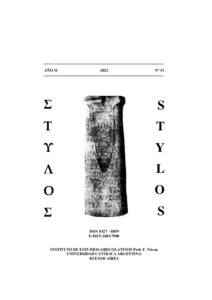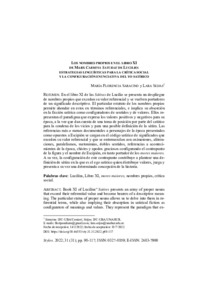Please use this identifier to cite or link to this item:
https://repositorio.uca.edu.ar/handle/123456789/15728| Título: | Los nombres propios en el libro XI de Marx Carmina Saturae de Lucilio : estrategias lingüísticas para la crítica social y la configuración enunciativa del yo satírico | Autor: | Saracino, María Florencia Seijas, Lara |
Palabras clave: | NOMBRE PROPIO; CRITICA SOCIAL; LITERATURA LATINA; FILOSOFIA ANTIGUA | Fecha de publicación: | 2022 | Editorial: | Pontificia Universidad Católica Argentina. Facultad de Filosofía y Letras. Instituto de estudios grecolatinos "Prof. F. Nóvoa" | Cita: | Saracino, M. F., Seijas, L. Los nombres propios en el libro XI de Marx Carmina Saturae de Lucilio : estrategias lingüísticas para la crítica social y la configuración enunciativa del yo satírico [en línea]. Stylos. 2022, 31. doi: 10.46553/sty.31.31.2022.p98-117. Disponible en: https://repositorio.uca.edu.ar/handle/123456789/15728 | Resumen: | Resumen: En el libro XI de las Sátiras de Lucilio se presenta un despliegue
de nombres propios que excedan su valor referencial y se vuelven portadores
de un significado descriptivo. El particular estatuto de los nombres propios
permite ahondar en estos en términos referenciales, e implica su absorción
en la ficción satírica como configuradores de sentidos y de valores. Ellos representan
el paradigma que expresa los valores positivos y negativos para su
época, a la vez que dan cuenta de una toma de posición por parte del satírico
para la condena de los vicios y para una posible definición de la sátira. Las
referencias más o menos documentales a personajes de la época presentados
como opuestos a Escipión se cargan en el código satírico de significados que
exceden su valor referencial y que se entremezclan con oximorones, aliteraciones,
paralelismos, metonimias, dobles sentidos, referencias a acontecimientos
de la época, chistes y apodos graciosos configurando el contrapunto
de la figura y el nombre de Escipión, en tanto portador de los mores maiores.
A su vez, la configuración de este contrapunto contribuye a plantear una definición
de sátira en la que es el ego satírico quien distribuye valores, juzga y
presenta a su vez una determinada concepción de la historia. Abstract: Book XI of Lucilius‟ Satires presents an array of proper nouns that exceed their referential value and become bearers of a descriptive meaning. The particular status of proper nouns allows us to delve into them in referential terms, while also implying their absorption in satirical fiction as configurators of meanings and values. They represent the paradigm that expresses the positive and negative values for their time, while at the same time manifesting a position taken by the satirist for the condemnation of vices and for a possible definition of satire. The more or less documentary references to characters of the time presented as opposed to Scipio are charged in the satirical code with meanings that exceed their referential value and are intermingled with oxymorons, alliterations, parallelisms, metonymies, double entendres, references to events of the time, jokes, and comic nicknames, forming the counterpoint of the figure and name of Scipio, as the bearer of the mores maiores. In turn, the configuration of this counterpoint contributes to propose a definition of satire in which it is the satirical ego that distributes values, judges, and presents a certain conception of history. |
URI: | https://repositorio.uca.edu.ar/handle/123456789/15728 | ISSN: | 0327-8859 (impreso) 2683-7900 (online) |
Disciplina: | LITERATURA | DOI: | 10.46553/sty.31.31.2022.p98-117 | Derechos: | Acceso abierto | Fuente: | Stylos. 2022, 31 |
| Appears in Collections: | STY - 2022 nro. 31 |
Files in This Item:
| File | Description | Size | Format | |
|---|---|---|---|---|
| stylos-31-portada.pdf | 130,99 kB | Adobe PDF |  View/Open | |
| nombres-propios-libro.pdf | 339,97 kB | Adobe PDF |  View/Open |
Page view(s)
69
checked on Apr 27, 2024
Download(s)
104
checked on Apr 27, 2024
Google ScholarTM
Check
Altmetric
Altmetric
This item is licensed under a Creative Commons License

